- Home
- Octavia E. Butler
Parable of the Sower Page 16
Parable of the Sower Read online
Page 16
“I was thinking of traveling as a man,” I said to him.
He seemed to be repressing a smile. “That will be safer for you. You’re at least tall enough to fool people. You’ll have to cut your hair, though.”
Zahra grunted. “Mixed couples catch hell whether people think they’re gay or straight. Harry’ll piss off all the blacks and you’ll piss off all the whites. Good luck.”
I watched her as she said it, and realized what she wasn’t saying. “You want to come?” I asked.
She sniffed. “Why should I? I won’t cut my hair!”
“No need,” I said. “We can be a black couple and their white friend. If Harry can get a reasonable tan, maybe we can claim him as a cousin.”
She hesitated, then whispered, “Yeah, I want to go.” And she started to cry. Harry stared at her in surprise.
“Did you think we were going to just dump you?” I asked. “All you had to do was let us know.”
“I don’t have any money,” she said. “Not a dollar.”
I sighed. “Where did you get those peaches?”
“You were right. I stole them.”
“You have a useful skill then, and information about living out here.” I faced Harry. “What do you think?”
“Her stealing doesn’t bother you?” he asked.
“I mean to survive,” I said.
“‘Thou shalt not steal,’” he quoted. “Years and years—a lifetime of ‘Thou shalt not steal.’”
I had to smother a flash of anger before I could answer. He wasn’t my father. He had no business quoting scripture at me. He was nobody. I didn’t look at him. I didn’t speak until I knew my voice would sound normal. Then, “I said I mean to survive,” I told him. “Don’t you?”
He nodded. “It wasn’t a criticism. I’m just surprised.”
“I hope it won’t ever mean getting caught or leaving someone else to starve,” I said. And to my own surprise, I smiled. “I’ve thought about it. That’s the way I feel, but I’ve never stolen anything.”
“You’re kidding!” Zahra said.
I shrugged. “It’s true. I grew up trying to set a good example for my brothers and trying to live up to my father’s expectations. That seemed like what I should be doing.”
“Oldest kid,” Harry said. “I know.” He was the oldest in his family.
“Oldest, hell,” Zahra said, laughing. “You’re both babies out here.”
And that wasn’t offensive, somehow. Perhaps because it was true. “I’m inexperienced,” I admitted. “But I can learn. You’re going to be one of my teachers.”
“One?” she said. “Who have you got but me?”
“Everyone.”
She looked scornful. “No one.”
“Everyone who’s surviving out here knows things that I need to know,” I said. “I’ll watch them, I’ll listen to them, I’ll learn from them. If I don’t, I’ll be killed. And like I said, I intend to survive.”
“They’ll sell you a bowl of shit,” she said.
I nodded. “I know. But I’ll buy as few of those as possible.”
She looked at me for a long time, then sighed. “I wish I’d known you better before all this happened,” she said. “You’re a weird preacher’s kid. If you still want to play man, I’ll cut your hair for you.”
MONDAY, AUGUST 2, 2027
(from notes expanded SUNDAY, AUGUST 8)
We’re on our way.
This morning Zahra took us to Hanning Joss, the biggest secure store complex in Robledo. We could get all we needed there. Hanning vendors sell everything from gourmet food to debusing cream, prostheses to homebirthing kits, guns to the latest in touchrings, headsets, and recordings. I could have spent days just wandering through the aisles, staring at the stuff I couldn’t afford. I had never been to Hanning before, had never seen anything like it in person.
But we had to go into the complex one at a time, leaving two outside to guard our bundles—including my gun. Hanning, as I had heard many times on the radio, was one of the safest places in the city. If you didn’t like their sniffers, metal detectors, package restrictions, armed guards, and willingness to strip-search anyone they thought was suspicious on the way in or out, you could shop somewhere else. The store was full of people eager to put up with the inconvenience and invasion of privacy if only they could buy the things they needed in peace.
No one strip-searched me, though I was required to prove that I wasn’t a deadbeat.
“Show your Hanning disc or money,” an armed guard demanded at the massive gates. I was terrified that he would steal my money, but I showed the bills that I intended to spend, and he nodded. He never touched them. No doubt we were both being watched, and our behaviors recorded. Such a security conscious store wouldn’t want its guards stealing the customers’ money.
“Shop in peace,” the guard said with no hint of a smile.
I bought salt, a small tube of honey, and the cheapest of dried foods—oats, fruit, nuts, bean flour, lentils, plus a little dried beef—all that I thought Zahra and I could carry. And I bought more water and a few odd items: water purification tablets—just in case—and sun blocker, which even Zahra and I would need, some stuff for insect bites, and an ointment Dad used for muscle aches. We would have plenty of those. I bought more toilet paper, tampons, and lip balm. I bought myself a new notebook, two more pens, and an expensive supply of ammunition for the .45. I felt better once I had that.
I bought three of the cheap, multipurpose sleepsacks—big, tough storage bags, and the preferred bedding of all the more affluent homeless. The country was full of people who could earn or steal food and water, but could not rent even a cot. These might sleep on the street or in makeshift shacks, but if they could, they put a sleepsack between their bodies and the ground. The sacks, with their own strapping, fold to serve as packs during the day. They’re light, tough, and able to survive most abuse. They’re warm even if you have to sleep on the concrete, but they’re thin—more useful than comfortable. Curtis and I used to make love on a pallet of them.
And I bought three oversized jackets of the same thin, breathing synthetic as the sleepsacks. They’ll finish the job of keeping us warm at night as we moved north. They look cheap and ugly, and that’s good. They might not be stolen.
That was the end of my money—the money I had packed in my emergency pack. I haven’t touched the money I took from the foot of the lemon tree. That I had split in half and put in two of my father’s socks. I kept it pinned inside my jeans, invisible and unavailable to pickpockets.
It isn’t a lot of money, but it’s more than I’ve ever had before—more than anyone could expect me to have. I pinned it where it is, rewrapped in plastic and secure in the socks on Saturday night when I had finished writing and still couldn’t stop thinking and remembering and knowing there was nothing I could do about the past.
Then I had a kind of tactile memory of grabbing the money packet and a handful of dirt and stuffing both into my pack. I had an incredible amount of nervous energy that was spending itself in jitteriness. My hands shook so that I could hardly find the money—by feel, in darkness. I made it an exercise in concentration to find the money, socks, and pins, divide the money in half, or as close to in half as I could without seeing, put it into the socks, and pin it in place. I checked it when I went out to urinate the next morning. I’d done a good job. The pins didn’t show at all on the outside. I’d put them through the seams down near my ankles. Nothing dangling, no problems.
I took my many purchases out to what was once the ground floor of a parking structure, and was now a kind of semienclosed flea market. Many of the things dug out of ash heaps and landfills wind up for sale here. The rule is that if you buy something in the store, you can sell something of similar value in the structure. Your receipt, coded and dated, is your peddler’s license.
The structure was patrolled, though more to check these licenses than to keep anyone safe. Still, the structure was safer than the str
eet.
I found Harry and Zahra sitting on our bundles, Harry waiting to go into the store, and Zahra waiting for her license. They had put their backs against a wall of the store at a spot away from the street and away from the biggest crowd of buyers and sellers. I gave Zahra the receipt and began to separate and pack our new supplies. We would leave as soon as Zahra and Harry finished their buying and selling.
We walked down to the freeway—the 118—and turned west. We would take the 118 to the 23 and the 23 to U.S. 101. The 101 would take us up the coast toward Oregon. We became part of a broad river of people walking west on the freeway. Only a few straggled east against the current—east toward the mountains and the desert. Where were the westward walkers going? To something, or just away from here?
We saw a few trucks—most of them run at night—swarms of bikes or electric cycles, and two cars. All these had plenty of room to speed along the outer lanes past us. We’re safer if we keep to the left lanes away from the on and off ramps. It’s against the law in California to walk on the freeways, but the law is archaic. Everyone who walks walks on the freeways sooner or later. Freeways provide the most direct routes between cities and parts of cities. Dad walked or bicycled on them often. Some prostitutes and peddlers of food, water, and other necessities live along the freeways in sheds or shacks or in the open air. Beggars, thieves, and murderers live here, too.
But I’ve never walked a freeway before today. I found the experience both fascinating and frightening. In some ways, the scene reminded me of an old film I saw once of a street in mid-twentieth-century China—walkers, bicyclers, people carrying, pulling, pushing loads of all kinds. But the freeway crowd is a heterogenous mass—black and white, Asian and Latin, whole families are on the move with babies on backs or perched atop loads in carts, wagons or bicycle baskets, sometimes along with an old or handicapped person. Other old, ill, or handicapped people hobbled along as best they could with the help of sticks or fitter companions. Many were armed with sheathed knives, rifles, and, of course, visible, holstered handguns. The occasional passing cop paid no attention.
Children cried, played, squatted, did everything except eat. Almost no one ate while walking. I saw a couple of people drink from canteens. They took quick, furtive gulps, as though they were doing something shameful—or something dangerous.
A woman alongside us collapsed. I got no impression of pain from her, except at the sudden impact of her body weight on her knees. That made me stumble, but not fall. The woman sat where she had fallen for a few seconds, then lurched to her feet and began walking again, leaning forward under her huge pack.
Almost everyone was filthy. Their bags and bundles and packs were filthy. They stank. And we, who have slept on concrete in ashes and dirt, and who have not bathed for three days—we fitted in pretty well. Only our new sleepsack packs gave us away as either new to the road or at least in possession of new stealables. We should have dirtied the packs a little before we got started. We will dirty them tonight. I’ll see to it.
There were a few young guys around, lean and quick, some filthy, some not dirty at all. Keiths. Today’s Keiths. The ones who bothered me most weren’t carrying much. Some weren’t carrying anything except weapons.
Predators. They looked around a lot, stared at people, and the people looked away. I looked away. I was glad to see that Harry and Zahra did the same. We didn’t need trouble. If trouble came, I hoped we could kill it and keep walking.
The gun was fully loaded now, and I wore it holstered, but half covered by my shirt. Harry bought himself a knife. The money he had snatched up as he ran from his burning house had not been enough to buy a gun. I could have bought a second gun, but it would have taken too much of my money, and we have a long way to go.
Zahra used the shoe money to buy herself a knife and a few personal things. I had refused my share of that money. She needed a few dollars in her pocket.
The day she and Harry use their knives, I hope they kill. If they don’t, I might have to, to escape the pain. And what will they think of that?
They deserve to know that I’m a sharer. For their own safety, they should know. But I’ve never told anyone. Sharing is a weakness, a shameful secret. A person who knows what I am can hurt me, betray me, disable me with little effort.
I can’t tell. Not yet. I’ll have to tell soon, I know, but not yet. We’re together, the three of us, but we’re not a unit yet. Harry and I don’t know Zahra very well, nor she us. And none of us know what will happen when we’re challenged. A racist challenge might force us apart. I want to trust these people. I like them, and…they’re all I have left. But I need more time to decide. It’s no small thing to commit yourself to other people.
“You okay?” Zahra asked.
I nodded.
“You look like hell. And you’re so damned poker-faced most of the time…”
“Just thinking,” I said. “There’s so much to think about now.”
She sighed her breath out in a near whistle. “Yeah. I know. But keep your eyes open. You get too wrapped up in your thinking, and you’ll miss things. People get killed on freeways all the time.”
16
❏ ❏ ❏
Earthseed
Cast on new ground
Must first perceive
That it knows nothing.
EARTHSEED: THE BOOKS OF THE LIVING
MONDAY, AUGUST 2, 2027
(cont. from notes expanded AUGUST 8)
HERE ARE SOME OF THE things I’ve learned today:
Walking hurts. I’ve never done enough walking to learn that before, but I know it now. It isn’t only the blisters and sore feet, although we’ve got those. After a while, everything hurts. I think my back and shoulders would like to desert to another body. Nothing eases the pain except rest. Even though we got a late start, we stopped twice today to rest. We went off the freeway, into the hills or bushes to sit down, drink water, eat dried fruit and nuts. Then we went on. The days are long this time of year.
Sucking on a plum or apricot pit all day makes you feel less thirsty. Zahra told us that.
“When I was a kid,” she said, “there were times when I would put a little rock in my mouth. Anything to feel better. It’s a cheat, though. If you don’t drink enough water, you’ll die no matter how you feel.”
All three of us walked along with seeds in our mouths after our first stop, and we felt better. We drank only during our stops in the hills. It’s safer that way.
Also, cold camps are safer than cheery campfires. Yet tonight we cleared some ground, dug into a hillside, and made a small fire in the hollow. There we cooked some of my acorn meal with nuts and fruit. It was wonderful. Soon we’ll run out of it and we’ll have to survive on beans, cornmeal, oats—expensive stuff from stores. Acorns are home-food, and home is gone.
Fires are illegal. You can see them flickering all over the hills, but they are illegal. Everything is so dry that there’s always a danger of campfires getting away from people and taking out a community or two. It does happen. But people who have no homes will build fires. Even people like us who know what fire can do will build them. They give comfort, hot food, and a false sense of security.
While we were eating, and even after we’d finished, people drifted over and tried to join us. Most were harmless and easily gotten rid of. Three claimed they just wanted to get warm. The sun was still up, red on the horizon, and it was far from cold.
Three women wanted to know whether two studs like Harry and me didn’t need more than one woman. The women who asked this may have been cold, considering how few clothes they had on. It’s going to be strange for me, pretending to be a man.
“Couldn’t I just roast this potato in your coals?” an old man asked, showing us a withered potato.
We gave him some fire and sent him away—and watched to see where he went, since a burning brand could be either a weapon or a major distraction if he had friends hiding. It’s crazy to live this way, suspecting helpless old peo
ple. Insane. But we need our paranoia to keep us alive. Hell, Harry wanted to let the old guy sit with us. It took Zahra and me together to let him know that wasn’t going to happen. Harry and I have been well-fed and protected all our lives. We’re strong and healthy and better educated than most people our age. But we’re stupid out here. We want to trust people. I fight against the impulse. Harry hasn’t learned to do that yet. We argued about it afterward, low voiced, almost whispering.
“Nobody’s safe,” Zahra told him. “No matter how pitiful they look, they can steal you naked. Little kids, skinny and big-eyed will make off with all your money, water, and food! I know. I used to do it to people. Maybe they died, I don’t know. But I didn’t die.”
Harry and I both stared at her. We knew so little about her life. But to me, at that moment, Harry was our most dangerous question mark.
“You’re strong and confident,” I said to him. “You think you can take care of yourself out here, and maybe you can. But think what a stab wound or a broken bone would mean out here: Disablement, slow death from infection or starvation, no medical care, nothing.”
He looked at me as though he wasn’t sure he wanted to know me anymore. “What, then?” he asked. “Everyone’s guilty until proven innocent? Guilty of what? And how do they prove themselves to you?”
“I don’t give a piss whether they’re innocent or not,” Zahra said. “Let them tend to their own business.”
“Harry, your mind is still back in the neighborhood,” I said. “You still think a mistake is when your father yells at you or you break a finger or chip a tooth or something. Out here a mistake—one mistake—and you may be dead. Remember that guy today? What if that happened to us?”
We had seen a man robbed—a chubby guy of 35 or 40 who was walking along eating nuts out of a paper bag. Not smart. A little kid of 12 or 13 snatched the nuts and ran off with them. While the victim was distracted by the little kid, two bigger kids tripped him, cut his pack straps, dragged the pack off his back, and ran off with it. The whole thing happened so fast that no one could have interfered if they’d wanted to. No one tried. The victim was unhurt except for bruises and abrasions—the sort of thing I had to put up with every day back in the neighborhood. But the victim’s supplies were gone. If he had a home nearby and other supplies, he would be all right. Otherwise, his only way of surviving might be to rob someone else—if he could.

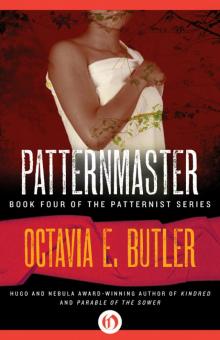 Patternmaster
Patternmaster Survivor
Survivor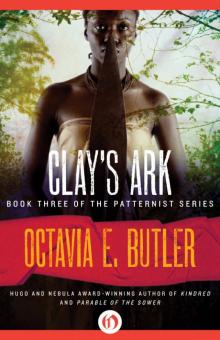 Clay's Ark
Clay's Ark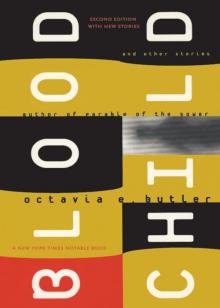 Bloodchild and Other Stories
Bloodchild and Other Stories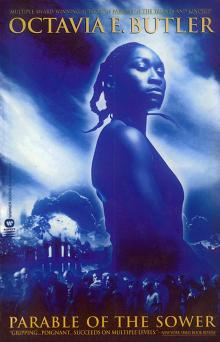 Parable of the Sower
Parable of the Sower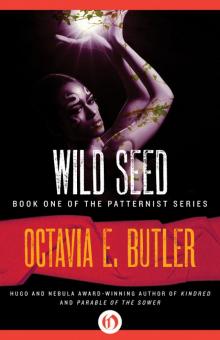 Wild Seed
Wild Seed Fledgling
Fledgling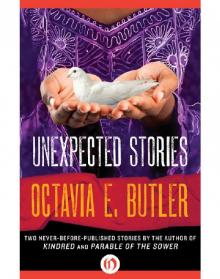 Unexpected Stories
Unexpected Stories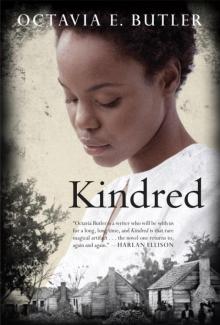 Kindred
Kindred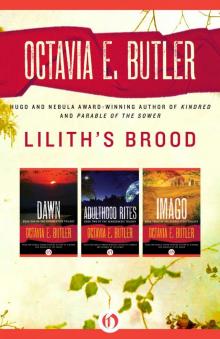 Lilith's Brood: Dawn / Adulthood Rites / Imago
Lilith's Brood: Dawn / Adulthood Rites / Imago Adulthood Rites
Adulthood Rites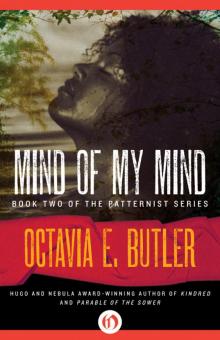 Mind of My Mind
Mind of My Mind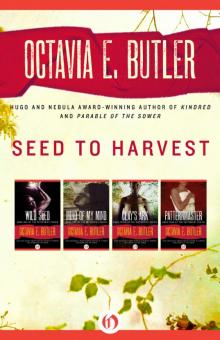 Seed to Harvest
Seed to Harvest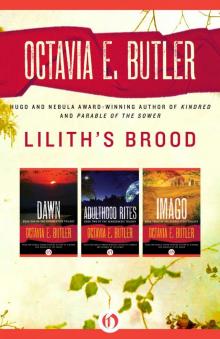 Lilith's Brood: Dawn, Adulthood Rites, and Imago (Xenogenesis Trilogy)
Lilith's Brood: Dawn, Adulthood Rites, and Imago (Xenogenesis Trilogy)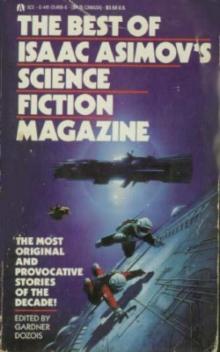 Bloodchild
Bloodchild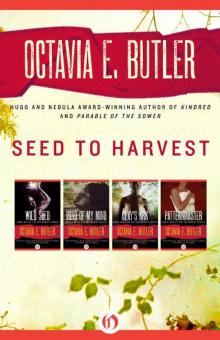 Seed to Harvest: Wild Seed, Mind of My Mind, Clay's Ark, and Patternmaster (Patternist)
Seed to Harvest: Wild Seed, Mind of My Mind, Clay's Ark, and Patternmaster (Patternist)